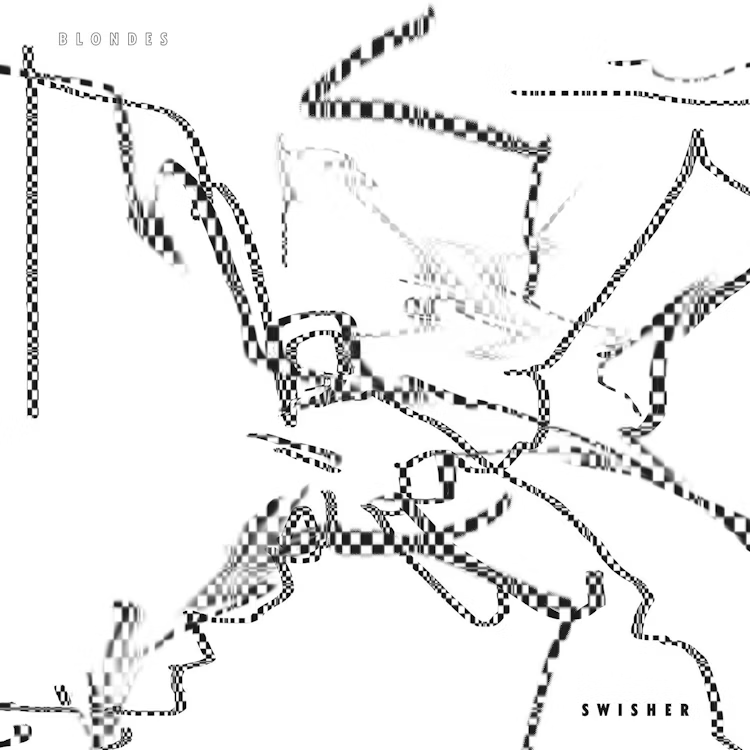"Swisher"

Having spent now a good deal of time with Swisher, Blondes’ second album – but which could be their first, or third, depending… well, exactly! Having spent time with Swisher, I’m now left questioning everything about Blondes, especially what I loved most about them and their last record, a self-titled compilation of a trilogy of two track 12”s with extras. This is ultimately fitting, because the exceptional techno-house duo seemingly began work on Swisher by questioning everything about themselves.
In Blondes’ previous work (glossing over a good-but-patchy EP on Merok), you could find transcendence – that almost literally seemed the point in those long, improvised live electronic pieces. Layers of synth, organs and drone would coalesce and kaleidoscope towards a state of absolute thoughtlessness in physical abandon, a 4/4 beat in control, leaving one to contemplate beauty in the reward of blissed-out climaxes and a perfectly exact, almost glib melody. Yet behind this search for pure physical sensuality, there was obviously a conflicting presence at work: considered mental processes seeking out just this state. It was not for nothing that the eight track record was divided into pairs, ‘dualities’ as they put it, for just such a game was at play in their deeply thought-out abdication of the brain in favour of the body and the search for the sublime.
Swisher is a deeper, less-rewarding record at first glance. Gone is that easy abandon to the physical realm: while the music is still 4/4-grounded improv techno, the command of the percussion over the body is lost to conflicting melodic layers above. They seem to begun by considering that sense of beauty and the sublime in their previous work and found it wanting, too easy, and so have sought to deconstruct it. By the end of some heavy listening, you understand that they’ve found something more beautiful still, all the more so because it is hard won, but just as they’ve had to work to find it, so must we.
Opener ‘Aeon’ can be read as a statement of intent: machine-clangorous, avoiding any sense of groove that could take us to a meditative physical remove, it’s closer to the techno of Carl Craig, Andy Stott or Raimi than their previous work where the emphasis was on the house rather than techno. ‘Bora Bora’, which follows, emphasises percussion but its layers soon obfuscate anything which might easily grab us, instead ascending towards feedback. So far, so disconcerting: a kind of archi-techno, if warehouses themselves were DJing.
‘Andrew’ sees a return to something more familiar from their back catalogue, and its here you begin to discern their motives. Beginning with a beautiful, cut up vocal sample reminiscent of the enduringly magnificent ‘Numb’ that opened Stott’s record last year, it utilises that slow building of layers they manage so well, introducing a rather twee keyboard refrain that harks back to the transcendent beauty they seem so bent on deconstructing. That refrain becomes more shrill as ominous drones build around it, until it is all but lost in a swirl. You develop a gambler’s investment in its survival against all this opposition: will this fragile melody survive? It appears not, as distorted mechanical phrases overwhelm it, though it determinedly continues in the background. Their new discordance trumps the past sublime.
The record plays out with more wonderful, industrial tracks: ‘Poland’ is an icy wasteland; the title track a just-contained mania of Ambient Works synths and clicks. As it goes by, agreeably enough, you can’t help but be nagged by the sense that something is missing. That something is the conclusion, ‘Elise’: as a friend remarked, “it’s like they took all the groove out of the other songs and dumped it into that last track.” Overwhelmingly so: it is searingly beautiful, soft where everything else has been jagged, a gently progressing caress, a reassurance that humanity is not lost. It’s a return to their sublime: beautiful again, all the more appreciable because of their dismantling of it previously. You suddenly appreciate more what they’ve been doing all along during this respite, this incitement to weary, end-of-the-world dance.
A lot of great, promising electronic artists have released curveball records this year, records that forego easy wins – Darkstar in particular spring to mind. None of them are the ‘Great’ records we might have wanted, nor immediately gratifying, but instead richly rewarding interrogations of their previous work that indicate those great records are still in the works. We should actually be grateful that they’re taking the scenic route in the hope of unexpected revelations on the way rather than ploughing up the obvious motorway – they’re taking the time to enjoy the journey because sometimes that’s the point. Swisher is a hugely exciting record for what it suggests is to come, and offers plenty to keep us enthralled while we wait.
Get the Best Fit take on the week in music direct to your inbox every Friday

Bon Iver
SABLE, fABLE

Mamalarky
Hex Key

Florist
Jellywish





